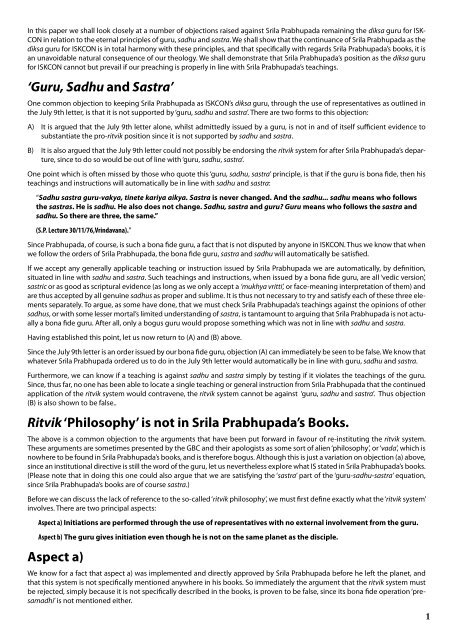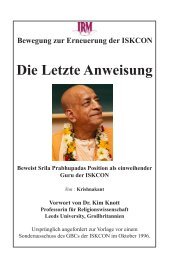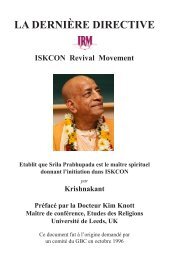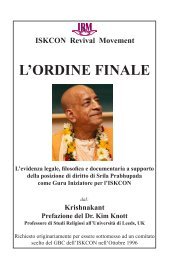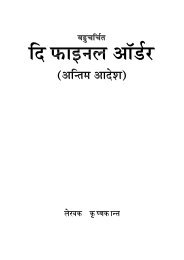The Sastric Basis for Srila Prabhupada's Continued DiksaStatus
The Sastric Basis for Srila Prabhupada's Continued DiksaStatus
The Sastric Basis for Srila Prabhupada's Continued DiksaStatus
You also want an ePaper? Increase the reach of your titles
YUMPU automatically turns print PDFs into web optimized ePapers that Google loves.
In this paper we shall look closely at a number of objections raised against <strong>Srila</strong> Prabhupada remaining the diksa guru <strong>for</strong> ISK-<br />
CON in relation to the eternal principles of guru, sadhu and sastra. We shall show that the continuance of <strong>Srila</strong> Prabhupada as the<br />
diksa guru <strong>for</strong> ISKCON is in total harmony with these principles, and that specifically with regards <strong>Srila</strong> Prabhupada’s books, it is<br />
an unavoidable natural consequence of our theology. We shall demonstrate that <strong>Srila</strong> Prabhupada’s position as the diksa guru<br />
<strong>for</strong> ISKCON cannot but prevail if our preaching is properly in line with <strong>Srila</strong> Prabhupada’s teachings.<br />
‘Guru, Sadhu and Sastra’<br />
One common objection to keeping <strong>Srila</strong> Prabhupada as ISKCON’s diksa guru, through the use of representatives as outlined in<br />
the July 9th letter, is that it is not supported by ‘guru, sadhu and sastra’. <strong>The</strong>re are two <strong>for</strong>ms to this objection:<br />
A) It is argued that the July 9th letter alone, whilst admittedly issued by a guru, is not in and of itself sufficient evidence to<br />
substantiate the pro-ritvik position since it is not supported by sadhu and sastra.<br />
B) It is also argued that the July 9th letter could not possibly be endorsing the ritvik system <strong>for</strong> after <strong>Srila</strong> Prabhupada’s departure,<br />
since to do so would be out of line with ‘guru, sadhu, sastra’.<br />
One point which is often missed by those who quote this ‘guru, sadhu, sastra’ principle, is that if the guru is bona fide, then his<br />
teachings and instructions will automatically be in line with sadhu and sastra:<br />
“Sadhu sastra guru-vakya, tinete kariya aikya. Sastra is never changed. And the sadhu... sadhu means who follows<br />
the sastras. He is sadhu. He also does not change. Sadhu, sastra and guru? Guru means who follows the sastra and<br />
sadhu. So there are three, the same.”<br />
(S.P. Lecture 30/11/76,Vrindavana).”<br />
Since Prabhupada, of course, is such a bona fide guru, a fact that is not disputed by anyone in ISKCON. Thus we know that when<br />
we follow the orders of <strong>Srila</strong> Prabhupada, the bona fide guru, sastra and sadhu will automatically be satisfied.<br />
If we accept any generally applicable teaching or instruction issued by <strong>Srila</strong> Prabhupada we are automatically, by definition,<br />
situated in line with sadhu and sastra. Such teachings and instructions, when issued by a bona fide guru, are all ‘vedic version’,<br />
sastric or as good as scriptural evidence (as long as we only accept a ‘mukhya vritti’, or face-meaning interpretation of them) and<br />
are thus accepted by all genuine sadhus as proper and sublime. It is thus not necessary to try and satisfy each of these three elements<br />
separately. To argue, as some have done, that we must check <strong>Srila</strong> Prabhupada’s teachings against the opinions of other<br />
sadhus, or with some lesser mortal’s limited understanding of sastra, is tantamount to arguing that <strong>Srila</strong> Prabhupada is not actually<br />
a bona fide guru. After all, only a bogus guru would propose something which was not in line with sadhu and sastra.<br />
Having established this point, let us now return to (A) and (B) above.<br />
Since the July 9th letter is an order issued by our bona fide guru, objection (A) can immediately be seen to be false. We know that<br />
whatever <strong>Srila</strong> Prabhupada ordered us to do in the July 9th letter would automatically be in line with guru, sadhu and sastra.<br />
Furthermore, we can know if a teaching is against sadhu and sastra simply by testing if it violates the teachings of the guru.<br />
Since, thus far, no one has been able to locate a single teaching or general instruction from <strong>Srila</strong> Prabhupada that the continued<br />
application of the ritvik system would contravene, the ritvik system cannot be against ‘guru, sadhu and sastra’. Thus objection<br />
(B) is also shown to be false..<br />
Ritvik ‘Philosophy’ is not in <strong>Srila</strong> Prabhupada’s Books.<br />
<strong>The</strong> above is a common objection to the arguments that have been put <strong>for</strong>ward in favour of re-instituting the ritvik system.<br />
<strong>The</strong>se arguments are sometimes presented by the GBC and their apologists as some sort of alien ‘philosophy’, or ‘vada’, which is<br />
nowhere to be found in <strong>Srila</strong> Prabhupada’s books, and is there<strong>for</strong>e bogus. Although this is just a variation on objection (a) above,<br />
since an institutional directive is still the word of the guru, let us nevertheless explore what IS stated in <strong>Srila</strong> Prabhupada’s books.<br />
(Please note that in doing this one could also argue that we are satisfying the ‘sastra’ part of the ‘guru-sadhu-sastra’ equation,<br />
since <strong>Srila</strong> Prabhupada’s books are of course sastra.)<br />
Be<strong>for</strong>e we can discuss the lack of reference to the so-called ‘ritvik philosophy’, we must first define exactly what the ‘ritvik system’<br />
involves. <strong>The</strong>re are two principal aspects:<br />
Aspect a) Initiations are per<strong>for</strong>med through the use of representatives with no external involvement from the guru.<br />
Aspect b) <strong>The</strong> guru gives initiation even though he is not on the same planet as the disciple.<br />
Aspect a)<br />
We know <strong>for</strong> a fact that aspect a) was implemented and directly approved by <strong>Srila</strong> Prabhupada be<strong>for</strong>e he left the planet, and<br />
that this system is not specifically mentioned anywhere in his books. So immediately the argument that the ritvik system must<br />
be rejected, simply because it is not specifically described in the books, is proven to be false, since its bona fide operation ‘presamadhi’<br />
is not mentioned either.<br />
1


